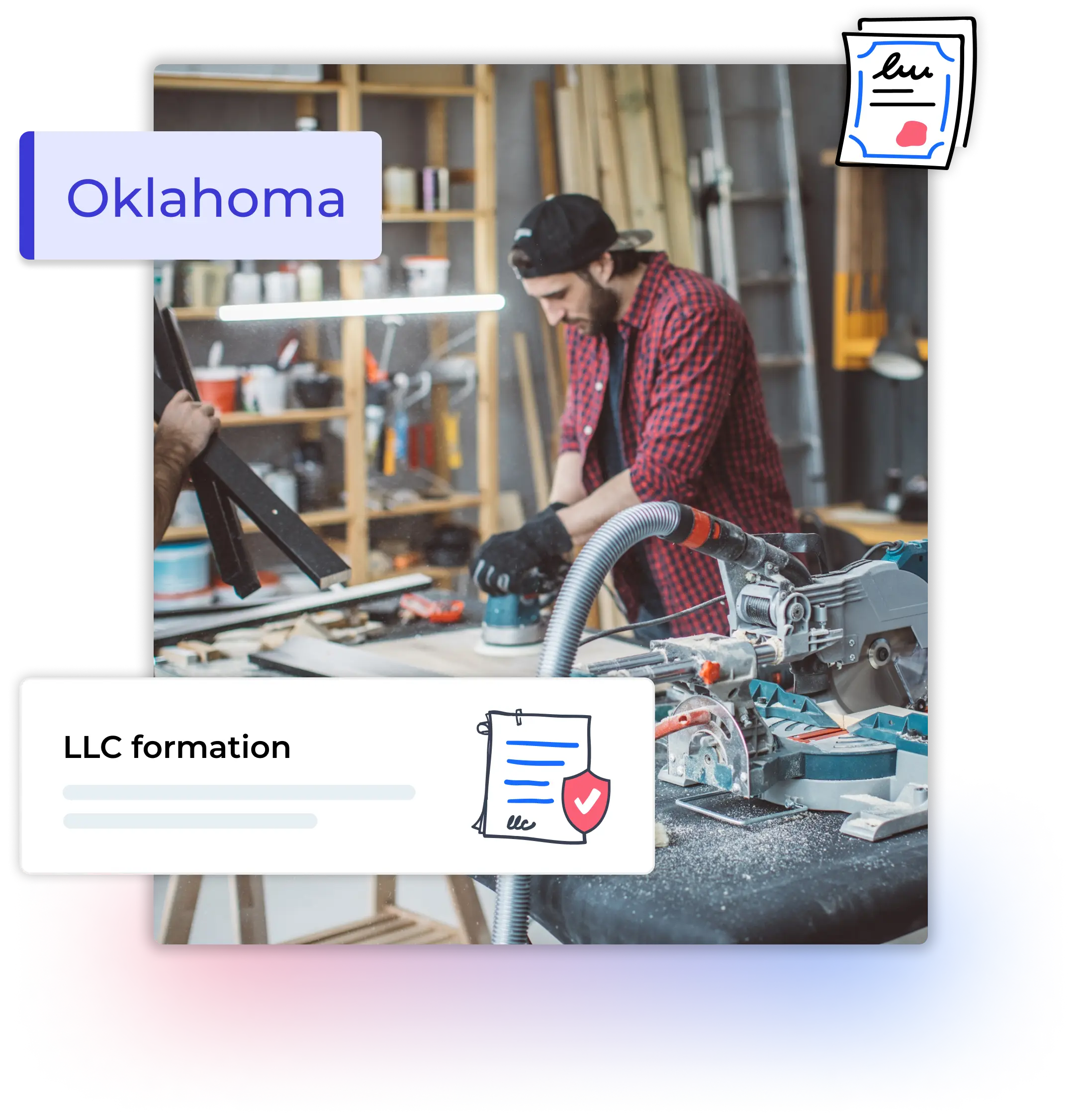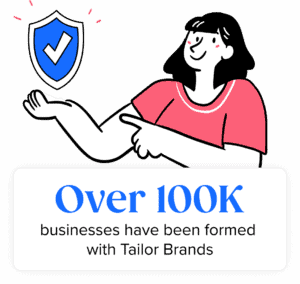Quick facts about forming an Oklahoma LLC
| Filing Fee | $100 |
| Processing Time | 1-2 business days online; up to 2 weeks by mail |
| Annual Report Fee | $25 |
| Registered Agent Required | Yes, must have a physical Oklahoma address |
| State Franchise Tax | None for LLCs |
| Business License | No statewide general business license, but local permits may be required |
| Managing Authority | Oklahoma Secretary of State, Business Filings Department |
How to start an LLC in Oklahoma in 5 steps
Registering a limited liability company (LLC) in Oklahoma allows you to enjoy protections offered by incorporation and an advantageous tax structure. In general, a corporation provides limited liability for the owners and protects them from being personally responsible or liable for business obligations and debts. Setting up an LLC may also protect your personal assets from attachment by business creditors.
Oklahoma offers flexibility in how an LLC decides to be taxed. You can form an LLC as a sole proprietor, partnership, S-corp, or C-corp and be taxed under the corporate structure you choose. One option is to form a partnership with a pass-through taxation structure. This allows you to distribute the profits through the LLC, but they are not taxed at the corporate level. Instead, the distributions are taxed at the personal level, avoiding double taxation. More advantages to starting an LLC in Oklahoma include that the filing is easy to complete and submit, has easy tax filing requirements every year, and has a low initial filing fee.
To form your Oklahoma LLC, you need to take the following 5 steps:
- Name your Oklahoma LLC
- Choose your registered agent
- File articles of organization
- Create an operating agreement
- Apply for an EIN
Read more for a detailed explanation and video that will help you go through each step of the process.
Step 1: Name your Oklahoma LLC
Now that you’ve decided to file an LLC, you must name your business as part of the process. You can pick any name you like as long as it’s not already in use by another corporation in Oklahoma. You can perform a Oklahoma business entity search and go online to www.sos.ok.gov for the Secretary of State’s website and navigate to the company name search page.
- Business names must be unique to avoid confusion between the state and existing companies
- The company name has to contain the words “limited liability company” or “limited company” or abbreviations including “LLC,” “LC,” “L.L.C.,” or “L.C.”
Step 2: Choose a registered agent
The state offers multiple options for who you may choose to be your Oklahoma registered agent. You can list yourself as the registered agent as long as you’re 18 or older and have a physical address in the state, or you can use a registered business entity in Oklahoma. The registered agent needs to be available during regular business hours to sign for and receive documents on behalf of the LLC.
It’s usually preferable to use a registered business entity to provide registered agent services for receiving documents. Another advantage of using our registered agent services is that it allows you to relocate your business to another address in Oklahoma without needing to file a change of address with the state and pay fees.
Step 3: File articles of organization
Articles of organization for forming an LLC in Oklahoma are straightforward. You need to supply the following information in your articles of organization.
State fees
Your LLC cost in Oklahoma includes the filing fee for the initial articles of organization is $100. There is an additional $4 processing fee when filing online (so $104 in total).
There is a $25 fee for papers filed in person for same-day processing.
Requirements
The principal place of business has to be a physical location. P.O. box addresses are not accepted. An email address for the company’s primary contact (not the registered agent) must be included. Every domestic and foreign LLC registered to do business in the state is required to file an Oklahoma annual certificate LLC on the company’s anniversary date. This confirms it’s an active business still located at the same physical address, and the email hasn’t changed.
How to file
Articles of organization can be filed in person at the Secretary of State’s office, online, or by mail.
You need to pay $104 in total fees when filing online (or if we do it for you), which includes the $100 state filing fee and a $4 processing fee (since a 4% service charge is added to the filing fee for using a credit card).
If you file on your own and by mail, you must mail the documents accompanied by a filing fee of $100. You can write out a check, cashier’s check, or money order and make it payable to the Oklahoma Secretary of State. The articles and payment can be mailed to:
Secretary of State
421 N.W. 13th Suite 210
Oklahoma City, Oklahoma 73103
If you need an expedited filing, you’ll have to pay an additional fee for the service. After you’ve filed online without expedited service, you can usually expect to receive confirmation of your articles of organization within 2 days. It can take around 7 to 10 business days for filings submitted by mail.
Step 4: Create an operating agreement
The Oklahoma Secretary of State does not require an LLC to create and submit an operating agreement as part of the articles of organization. However, if you’re forming an LLC with partners, you should seriously consider creating an operating agreement for all partners to abide by. Having one in place from when the LLC is formed will help avoid disagreements and arguments between partners. The operating agreement also lays out goals for the business, which gives everyone involved a framework to reference and build from as the business grows.
An LLC operating agreement Oklahoma should be considered a must in that it firms up everyone’s intentions for the business and makes its contents enforceable in civil court if needed. However, the state of Oklahoma does not require the submission of an operating agreement during the formation of the LLC and has no opinion about its necessity.
Step 5: Apply for an EIN
The EIN, or Employer Identification Number, is not explicitly required by the state of Oklahoma (it’s required by the IRS), but you should request one from the IRS regardless. Technically, you won’t need an EIN if you decide to be taxed as a sole proprietor, but it’s a good idea to obtain one in case your plans change. You’ll need an EIN if you’re opting to have the business taxed as a corporation or if you intend to hire employees.
The EIN is issued by the IRS and is a unique identifier used to track a given corporate entity’s taxes. You use the EIN for reporting and submitting payroll and corporate income taxes to the IRS. The EIN is free, and you can easily apply for one online through the IRS website or have us at Tailor Brands take care of it for you.
If you want to apply on your own, you can go directly to the webpage for the EIN application and enter the requested information. To apply, your business has to be located in the U.S. or a U.S. territory and have a valid Taxpayer Identification Number (TIN). This includes a Social Security Number (SSN), Individual Taxpayer Identification Number (ITIN), or EIN.
The application for the EIN has to be completed in one session as the IRS does not allow you to save and resume later. The session expires after 15 minutes of inactivity, and you’ll have to start over again. Be sure to review the information requirements before starting the form and have all the information to hand as you fill it out.
When you file for your EIN, you’ll be asked to choose your corporate status for the purposes of taxation. You can select sole proprietorship, partnership, C-corporation, or S-corporation. Each type of status comes with plusses and minuses, and you should consult with a tax professional before selecting a corporate status. Depending on your business structure, you may find that a partnership structure makes more sense than an S-corporation structure.
Getting an EIN has its advantages, even if you’re operating as a sole proprietor. The EIN can be used in place of your SSN, adding a layer of protection between your business and your personal finances. It also enables you to open corporate business accounts and gain access to the flexibility of banking at the business level. You can use your business name on your 1099s if you retain contractors, and it makes it easier to take care of FICA taxes if you hire employees at some point.
FAQ
It costs $100 to file your Articles of Organization with the Oklahoma Secretary of State, online or by mail.
Online filings are usually approved within one to two business days, while mailed filings can take up to two weeks.
Yes, every Oklahoma LLC must appoint a registered agent with a physical Oklahoma address. This can be yourself or you can use a registered agent service.
Oklahoma does not require an operating agreement, but having one is recommended to define ownership structure and management responsibilities.
Yes, Oklahoma requires an Annual Certificate and a $25 filing fee each year.
Oklahoma does not impose a franchise tax on LLCs.
Oklahoma does not require a statewide general business license, but many cities and industries require local permits or registrations.
You can dissolve an Oklahoma LLC by filing Articles of Dissolution with the Secretary of State and paying the $50 filing fee, then wrapping up any remaining business according to your operating agreement.




